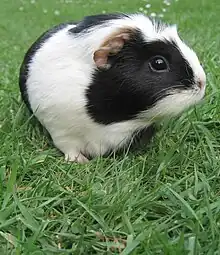hystricognath
English

A hystricognath, Cavia porcellus (a guinea pig)
Noun
hystricognath (plural hystricognaths)
- (zoology) Any member of the infraorder Hystricognathi of rodents, distinguished from other rodents by the bone structure of their skulls.
- 1996, José Roberto Moreira, David W. Macdonald, “7: Capybara use and conservation in South America”, in V.J. Taylor, N. Dunstone, editors, Exploitation of Mammal Populations, page 89:
- The New World hystricognath rodents (= caviomorphs) today represent one of the most diverse and widespread suborders among the over 800 mammal species of South America (Woods, 1982).
- 2008, Felipe Bandoni de Oliveira, Eder Cassola Molina, Paul A. Garber, Gabriel Marroig, “Chapter 3: Paleogeography of the South Atlantic: a Route for Primates and Rodents into the New World?”, in Alejandro Estrada, Julio Cesar Bicca-Marques, Eckhard W. Heymann, Karen B. Strier, editors, South American Primates, page 63:
- The situation is similar with respect to rodents, given that the earliest undisputed hystricognaths are from the Oligocene of Pakistan and Egypt (ca. 35Ma), with the possibility of a Middle Eocene origin for the group (Bryant and McKenna 1995; Marivaux et al. 2002).
- 2009, Michael J. Benton, Vertebrate Palaeontology, page 359:
- The hystricognaths include several lines that radiated in Africa and South America in the Oligocene and Miocene. […] The largest hystricognath group is the Caviomorpha, the South American guinea pigs, capybaras, chinchillas and New World porcupines.
Hyponyms
- (species of Hystricognathi): caviomorph (South American species)
Related terms
This article is issued from Wiktionary. The text is licensed under Creative Commons - Attribution - Sharealike. Additional terms may apply for the media files.